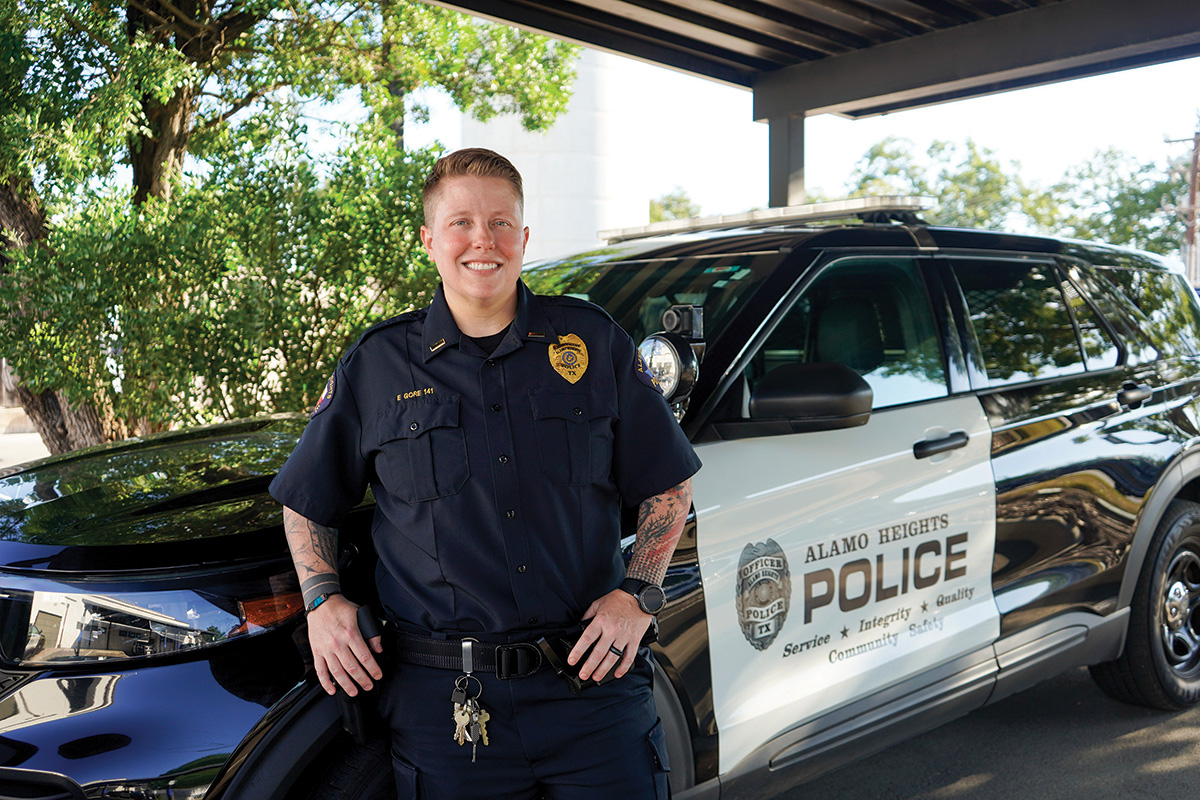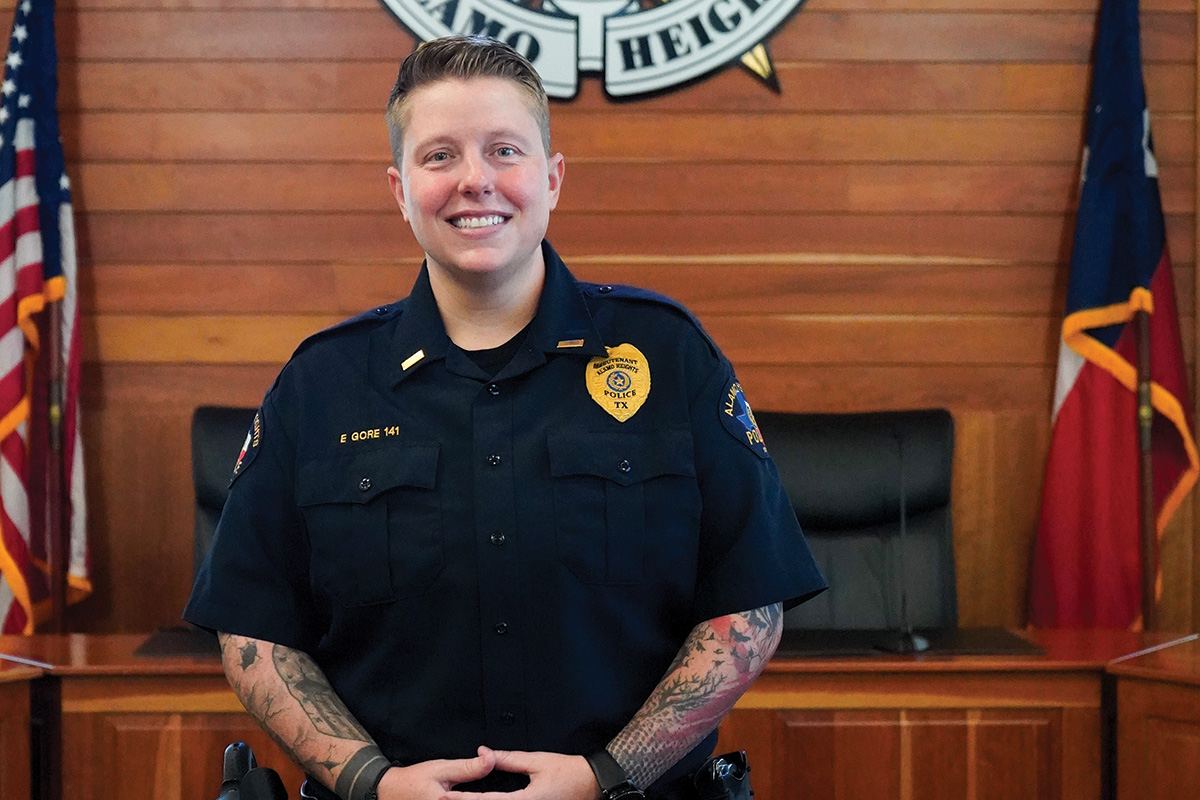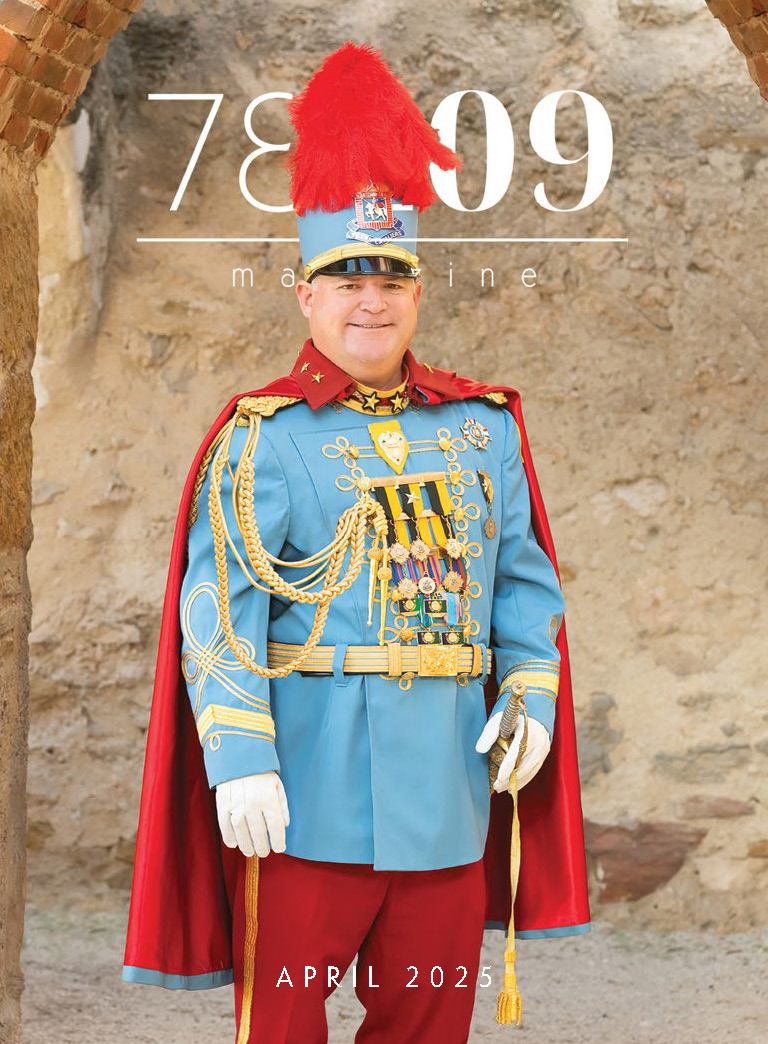A Guide to Effective Leadership
By Angel Santiago | Photography by Taylor Lane
Why do police officers make the best leaders?
Because they know how to serve and protect their team’s potential!
Emily Gore, a police lieutenant with Alamo Heights PD, exemplifies this. She empowers her team to solve problems and see challenges as opportunities while leading by example. For Gore, leadership is influencing others toward a common goal, and it starts with self-leadership. She emphasizes the importance of caring for her physical, mental, emotional, and spiritual health, along with pursuing hobbies to maintain balance. “Leading yourself and taking care of yourself outside the job is crucial. Fitness, eating right, and caring for your mental, emotional, and spiritual health—whether that means going to church or spending time with family – are all important. I have many outdoor hobbies like camping and fishing. Taking care of myself in these ways makes me a better leader and allows me to be there for my team.”
Gore is a living, breathing example of what self-leadership is all about. Life, both personally and professionally, is going to come at you, and for you to thrive, the journey is going to require you to be physically strong, mentally sharp and clear, emotionally resilient, and spiritually grounded. At a basic level, all you need is one daily win in each of these areas to maintain good overall health and well-being.
The goal is to achieve four daily wins:
A physical win: Walking, running, lifting, swimming.
A mental win: Reading, writing, creating, learning.
An emotional win: Journaling, emotional regulation, say no, talk with someone.
A spiritual win: Praying, meditating, volunteering, reading spiritual books.
This holistic approach to well-being not only boosts physical health but also sharpens the mind, stabilizes emotions, and nurtures the spirit. One of the most effective ways to empower your team is by modeling these healthy habits yourself.
Empowering her team is at the heart of Gore’s leadership style. She inspires her officers to take ownership, solve problems, and become self-sufficient. “Empowering the sergeants, corporals, and officers I work for is a priority. When they come to me with an issue, my first question is, ‘What do you want to do about it?’ I want to inspire them to solve their own problems because I won’t always be here. Eventually, someone else will take my place, and I want them to empower others the same way.”
Did you know that leaders who empower their teams experience 20-50% lower turnover rates? That’s because employees feel more engaged, connected to their purpose, and motivated to stay.
I love and respect her approach because she’s not just leading—she’s creating future leaders. By fostering independence and critical thinking, she equips her team with the skills, confidence, and mindset to lead others, ensuring long-term growth and sustainability.
One of my favorite moments from our interview was her perspective on failure. She sees it as a learning opportunity and encourages her team to do the same. “Failure is a learning opportunity. We all make mistakes—it’s part of being human. I tell them, ‘You’re going to mess up paperwork or make a wrong decision, and that’s okay.’ It takes ten years to become proficient in this job because it’s complex and constantly changing. Laws change every two years, so you have to adapt. When things go wrong, we may have a stern talk, but ultimately, it’s about correcting, adapting, and overcoming.”
We live in a society that fears failure. From a young age, we’re told failure isn’t an option. But if failure isn’t an option, neither is success—because there’s no success without failure. Contrary to popular belief, failure isn’t the opposite of success; stagnation is. Not taking action is the true failure. If we can become comfortable with mistakes, setbacks, and obstacles and embrace them as learning opportunities, we’ll achieve more and inspire those around us to step out of their comfort zones. Success thrives in environments where failure is seen as a stepping stone, not a roadblock.
Success is a journey, not a destination. Winston Churchill once said, “Success consists of going from failure to failure without loss of enthusiasm.” That’s exactly what Gore advises aspiring leaders: stay motivated and challenge yourself to avoid career stagnation. “Don’t take your foot off the gas. Never take your foot off the pedal because once you’re in a place where you’re doing good and you’re excelling, if you take your foot off the gas, slowing down will hold you back from achieving your goals. So don’t get comfortable and always challenge yourself – always.”
Gore’s leadership is a model of continuous growth, resilience, and accountability. Her insights can help you embrace challenges, foster self-improvement, and reach your goals. If you’re ready to unlock your potential and embrace a growth mindset, let’s work together. As a leadership and mindset coach, I’ll help you build resilience, confidence, and strategies to achieve your goals. Take the first step toward your future—contact me today to schedule a session and start your journey to becoming the leader you aspire to be!
Blessings,
#LifeCoachAngel
210.239.3435







